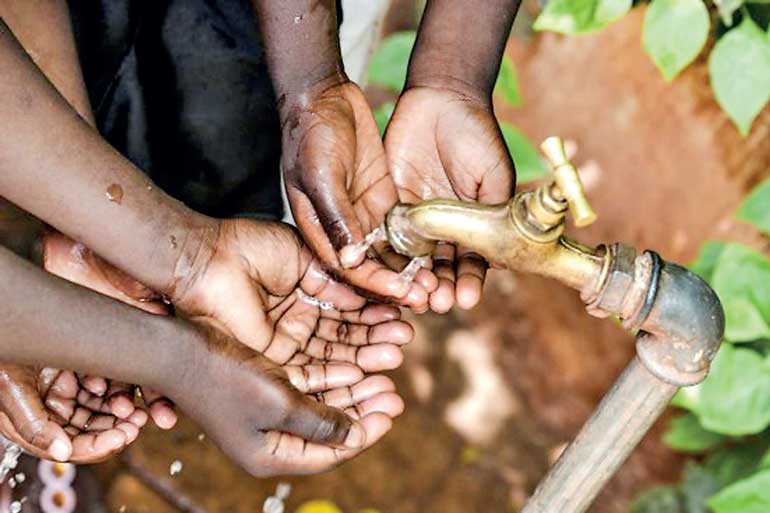Saturday Feb 28, 2026
Saturday Feb 28, 2026
Monday, 4 September 2017 00:00 - - {{hitsCtrl.values.hits}}
Tepic, Mexico (Thomson Reuters Foundation): ountries need to quadruple spending to $150 billion a year to deliver universal safe water and sanitation, helping to reduce childhood disease and deaths while boosting economic growth, said the World Bank.

Investments should be better coordinated and targeted to ensure services reach the most vulnerable, and governments need to engage the private sector more closely to meet the high costs, said the World Bank in a report released on Monday.
“Millions are currently trapped in poverty by poor water supply and sanitation,” Guangzhe Chen, senior director of the World Bank’s global water practice, said in a statement.
“More resources, targeted to areas of high vulnerability and low access, are needed to close the gaps and improve poor water and sanitation services.”
The high cost of clean water risks jeopardising the ability of countries to meet the United Nations’ Sustainable Development Goal of providing access to safe and affordable sanitation for all by 2030, said the World Bank.
More than three quarters of those without piped water supplies live in rural areas, where only 20% have access to “improved sanitation” said the report. In cities, poor people are up to three times less likely to have piped water than people in better off areas.
The risk of diarrhoeal diseases and malnutrition caused by unsafe water and poor sanitation is creating a “silent emergency”, with stunted growth affecting more than 40% of children under five in countries including Guatemala, Niger, Yemen and Bangladesh, said the report.
It said under-nutrition could have long-term effects on children, including poor mental development and reduced ability to work, which would eventually affect economic development.
Some countries fail to maintain infrastructure or struggle to cope with growing populations. Nigeria provided piped water to fewer than 10% of city dwellers in 2015, down from 29% 25 years earlier. In Haiti, only 7% of households have piped water, compared to 15% previously.
“Water and sanitation services need to improve dramatically or the consequences on health and well-being will be dire,” said Rachid Benmessaoud, Nigeria Country Director for the World Bank.
No single solution
In some countries, tap water is even more unsafe than pond water, with around 80% of Bangladesh’s piped supplies contaminated by E.coli bacteria, said the report. It urged governments to better inform people and encourage more household water treatment.
Providing piped water in cities could generate economies of scale, the bank said, urging greater private-sector involvement in urban water provision where recovering costs may be easier.
Researchers, decision makers and aid specialists are meeting in Stockholm for the annual World Water Week where they will focus on how to reduce waste in water use.
Water and sanitation improvements should be linked to health programmes to better tackle disease and malnutrition, said the World Bank report.
“Renewed efforts are needed to address those populations at greatest risk of death and disease due to inadequate water supply, sanitation and hygiene, which threatens human capital and economic development,” it said.
Understanding and recognising the many different values attached to water is a key to more efficient use – a must as more people have to share the world’s limited freshwater.
World Water Week closed on Friday, having welcomed over 3,200 participants from 133 countries.
Water is the lifeline of our civilisation. Without it, there is no hope of sustaining households, industries, food and energy production, or such key functions as hospitals.
A growing global population is creating a higher demand for freshwater. Climate-driven changes in weather patterns, leading to extended droughts and devastating floods, further exacerbate pressure on our common water resources. Access to safe water is necessary in order to implement the global development agenda.
“With increasing scarcity, we must recognise the many values attached to water, be it economic, social, environmental, cultural or religious. I believe that by re-valuing water, we will develop a deeper understanding and respect for this precious resource, and thus be better prepared for more efficient use,” said SIWI’s Executive Director Torgny Holmgren
Throughout World Water Week, links were made between the different values of water, including its monetary value. “I believe we will see more diverse pricing structures in the future, allowing for more economical and efficient use,” said Holmgren.
Nomvula Mokonyane, Minister of Water and Sanitation in South Africa, stressed that we need to embrace new technologies. “We cannot afford to continue to do what we did yesterday and expect to see a different result tomorrow. We must be bold!” she said.
Mark Watts from C40, that gathers city mayors, spoke about risks that big cities face: “Water pattern disruption is often the first sign of serious climate impacts and 70% of our member cities are already seeing the significant and negative impacts of climate change. 64% of our member cities face significant risk from surface and flash floods,” he said.
During World Water Week, Stockholm Junior Water Prize was awarded to Ryan Thorpe and Rachel Chang, USA, by H.R.H. Crown Princess Victoria of Sweden. Stockholm Water Prize was presented to Professor Stephen McCaffrey, USA, by H.M. Carl XVI Gustaf, King of Sweden, and patron of the prize.